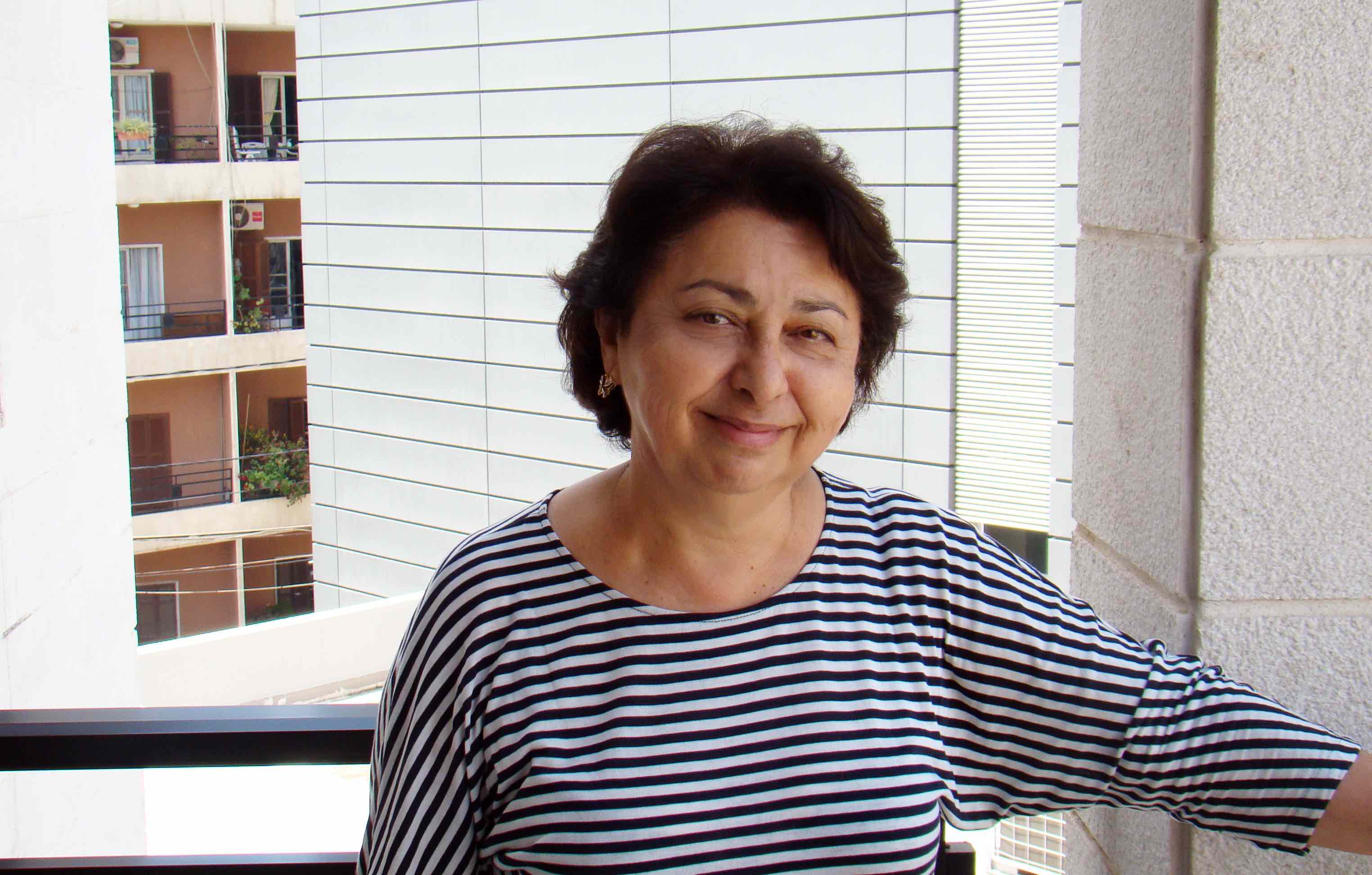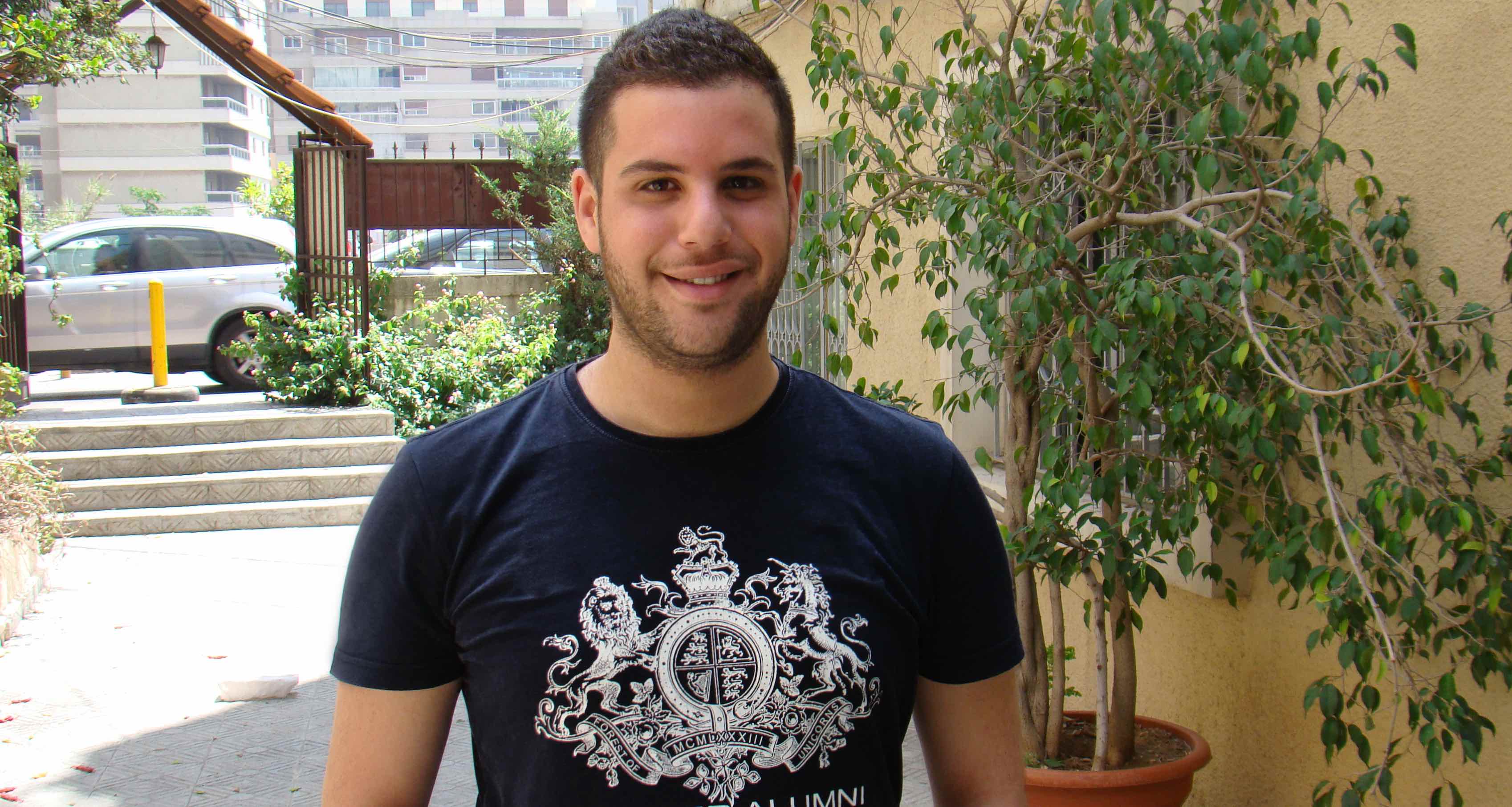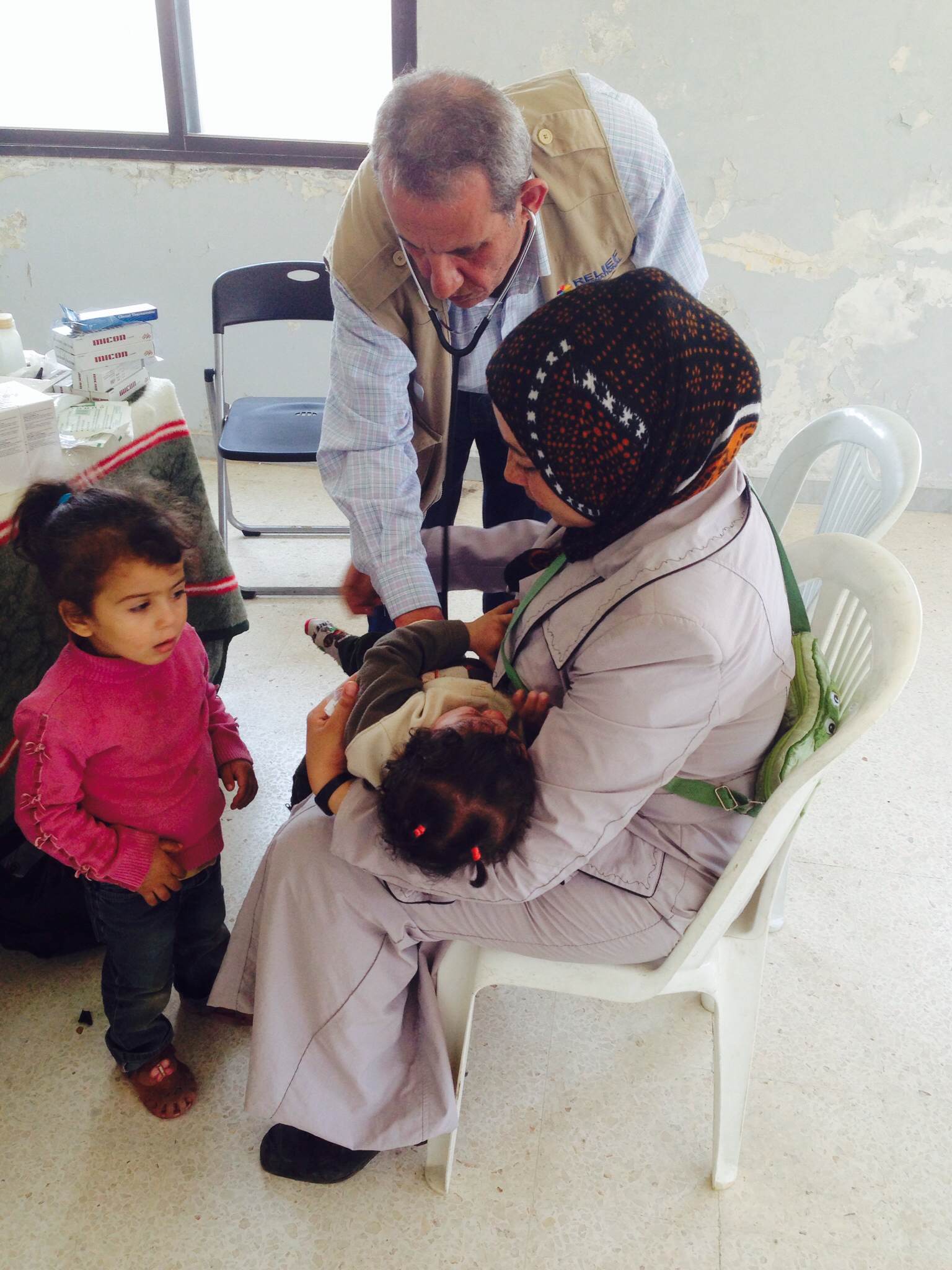Relief International nutrition and health programme in Lebanon
By Jamila Karimova and Jo Hammoud
 Jamila Karimova is the Health and Nutrition Programme Manager at Relief International (RI) Lebanon. She has been working with RI for 12 years; three years as a national staff in Azerbaijan and nine years within RI’s Health and Nutrition programmes in Darfur, Southern Sudan, Haiti, Somalia, and Lebanon.
Jamila Karimova is the Health and Nutrition Programme Manager at Relief International (RI) Lebanon. She has been working with RI for 12 years; three years as a national staff in Azerbaijan and nine years within RI’s Health and Nutrition programmes in Darfur, Southern Sudan, Haiti, Somalia, and Lebanon.
Jo Hammoud is the Communications and Reporting Officer at RI Lebanon. Jo had been working with Lebanese and international civil society organisations in Lebanon and Europe for seven years on different issues ranging from communications and access to information, sexual and reproductive health, national humanitarian development programmes, Palestinian and Iraqi refugee programs, and the regional response for the Syrian crisis.
 The authors acknowledge the support of Philippe Clerc, Former Regional Country Director, Relief International, and UNICEF. This article grew out of a meeting with Philippe Clerc during ENNs April 2014 visit to the region.
The authors acknowledge the support of Philippe Clerc, Former Regional Country Director, Relief International, and UNICEF. This article grew out of a meeting with Philippe Clerc during ENNs April 2014 visit to the region.
Relief International (RI) is a humanitarian non-profit agency that provides emergency relief, rehabilitation, development assistance, and programme services to vulnerable communities worldwide. RI is a non-political and non-sectarian organisation exclusively dedicated to reducing human suffering. Since 2006, RI has been working in Lebanon to provide emergency relief and long-term support to communities across the country. Through partnering with several organisations, RI Lebanon successfully launched several projects in the field of information and communications technology, local economic development, education, and nutrition.
 On March 15, 2011, the unrest in Syria began as a part of the Arab Spring in the Middle East. In spite of the willingness of the Lebanese people to host Syrian refugees, with over 1,000,000 Syrian refugees currently living in Lebanon, the resulting strain on resources, including jobs, education, health, and housing, has made relations between the refugee and host communities tense and prone to incidents of harassment. In 2012, RI set up life-saving operations in Lebanon to assist Syrian refugees and host Lebanese families living in vulnerable host communities.
On March 15, 2011, the unrest in Syria began as a part of the Arab Spring in the Middle East. In spite of the willingness of the Lebanese people to host Syrian refugees, with over 1,000,000 Syrian refugees currently living in Lebanon, the resulting strain on resources, including jobs, education, health, and housing, has made relations between the refugee and host communities tense and prone to incidents of harassment. In 2012, RI set up life-saving operations in Lebanon to assist Syrian refugees and host Lebanese families living in vulnerable host communities.
The programme responds to the specific objectives prioritised within UNHCR’s Syria Regional Response Plan 6 (RRP6) as well as the Health Cluster, through the improvement of primary health and nutrition services and increased access to emergency quality nutrition and health services. These needs were identified as key concerns in informal tented settlements (ITS) and host communities. The current RI health and nutrition programme is funded by UNICEF (November 2013 to June 2015 as a minimum).
To date (June 2014), RI has reached 193,553 beneficiaries living in ITSs in Beirut, Mount Lebanon and North Lebanon, and is currently expanding to West Bekaa and Rashayya. The programme aims to increase the availability, awareness, and access to emergency nutrition and health services for refugee and host communities, with a special focus on children under the age of five years, as well as pregnant and lactating women (PLW).
Health programme
With the support of the management, operations, human resources and communications departments to the nutrition programme, RI’s four medical doctors, four midwives, seven nurses, two vaccinators, 13 community nutrition promoters, and 12 psychosocial workers implement the activities and services in the field. Five mobile clinics operate regularly in the governorates of Beirut, Bekaa, Mount Lebanon, Tripoli, and Akkar. These are the sites with most vulnerable refugee and host communities in ITSs and collective shelters as identified by UNHCR. The mobile clinics provide a variety of free services, such as consultations and treatment for acute illnesses, reporting on early warning information about morbidity (EWARN), paediatric consultations, vaccinations, essential medication and supplies, and health education. Moreover, reproductive health services are provided (ante and post-natal care) as well as family planning and support for victims of sexual and gender based violence (SGBV). In addition to healthcare delivery, RI also maintains a stock of medical supplies and resources such as Ready to Use Supplementary Food (RUSF), Ready to Use Therapeutic Food (RUTF), NRG-51, micronutrients (doses of Vitamins A and C, Iron Syrup, Folic Acid, and/or Ferrous Sulphate are prescribed as needed), and protein rich biscuits. There are trained staff on SGBV healthcare, counselling and a referral mechanism operating in the mobile clinics and offering treatment for sexual transmitted infections (STIs), Post-Exposure Prophylaxis (PEP Kits) in response to HIV, hepatitis and tetanus vaccinations, contraceptive pills, pain relief, wound care and antibiotics. RI also has in place a referral system to UNHCR and the Lebanese Ministry of Public Health’s secondary or tertiary health facilities that ensure a rapid medical response2 and care of SGBV survivors who require a more specialised assistance.
Souad a 29-year-old pregnant refugee in Bourj Barajneh said [translated to English]: “I was pregnant, in my first trimester, when Relief International visited our camp. I was suffering from weakness in my body due to shortage in food, water and increasing stress due to our situation. Relief International provided me with micronutrients and folic acids, which helped me, restore my energy. I have a new child now, and Relief International are still following up with me and him; giving both of us supplements for breastfeeding and general health consultations.”
Nutrition programme
An RI network comprised of 15 Community Nutrition Promoters (CNPs), coordinated by three Nutrition Monitors, was activated in refugee settings and vulnerable locations in ITSs and collective shelters in Beirut, Mount Lebanon, North (T-5) and the West Bekaa Valley. A simplified community screening system has been established in the current health and nutrition programme and is the direct link to RI mobile clinics and MOPH primary health care facilities3 for referral of cases of acute malnutrition identified. CNP outreach activities include Mid-Upper Arm Circumference (MUAC) screening of children under five years and PLW twice a week in the community during home visits. CNPs also work with RI mobile clinics and primary health care sites to detect undernourished children. If CNPs find any child or PLW with malnutrition, they refer them to the RI mobile clinics for further case management as per UNICEF’s protocols on the management of malnutrition in Lebanon. The beneficiaries identified by CNPs from their catchment area and admitted to the outpatient therapeutic programme (OTP) are closely followed up at household level on a weekly basis, as well as after treatment for two consecutive weeks. Critical cases are immediately referred to UNHCR contracted hospitals or the PHC of the Lebanese Ministry of Public Health who have been trained on malnutrition treatment by UNICEF/IOCC. Cases are then monitored by health providers of those agencies.
The duration of treatment varies on how the patient responds to medication, time since diagnosis, and whether they have only malnutrition or malnutrition in combination with diarrhoea. For cases who are moderately or severely acutely malnourished, RI provides UNICEF’s in-kind supplies in the form of micronutrients and vitamins for malnutrition, oral rehydration salts for diarrhoea, and/or other medication, as indicated. This component of the programme, in conjunction with outreach and community participation, helps ensure the appropriate coverage of identified cases via close communications with parents and families of the patients.
Caseload
As of June 2014, RI has identified 519 acute malnutrition cases. Table 1 details the progress of acutely malnourished children under 5 years referred to the RI mobile clinics and treated by the nutrition programme, covering the period of December 2013 to June 2014. Because there were no existing protocols in Lebanon for treating PLWs with malnutrition, RI provides them with support and supplements, such as NRG-5, folic acids, and vitamins throughout pregnancy. The discharge rate is low where patients have only been recently admitted and are still undergoing treatment, and also due to the poor water and sanitation conditions in the home environment that are contributing to diarrhoea and hence complicating management and extending their stay. The number of defaulters is high in some areas (e.g. Akkar/Halba, Minieh/Del Amar) due to the mobility of the refugees seeking seasonal agricultural farming work, security issues, or their return to Syria. Defaulting is less of a feature in Beirut/Mount Lebanon (an urban population with no migration and a low caseload) and Bekaa valley (an informal settlement with a stable population involved in local agricultural activities – the main seasonal migration from the North to Bekaa happens during the summer and autumn).
Table 1: Acute malnutrition caseload and progress for children under 5 years in the RI nutrition programme (Dec 2013 to June 2014)
|
Areas |
Total SAM |
Total MAM |
Total no. of malnutrition cases |
No. of cases discharged |
% of discharged cases |
Total no. of defaulters |
% of defaulters |
North |
|
|
|
|
|
|
|
|
Koura/ Kalamoun/ Zgharta |
5 |
25 |
30 |
15 |
50.0% |
1 |
3.3% |
|
Minieh/ Der Amar |
6 |
45 |
51 |
41 |
80.4% |
7 |
13.7% |
|
Danieh |
2 |
3 |
5 |
0 |
0.0% |
1 |
20.0% |
|
Tripoli |
4 |
18 |
22 |
18 |
81.8% |
3 |
13.6% |
|
Akkar/ Halba |
38 |
176 |
214 |
160 |
74.8% |
12 |
5.6% |
Total North Lebanon |
55 |
267 |
322 |
234 |
72.7% |
24 |
7.5% |
|
Bekaa |
46 |
122 |
168 |
148 |
88.1% |
0 |
0.0% |
|
Beirut |
1 |
5 |
6 |
6 |
100.0% |
0 |
0.0% |
|
Mount Lebanon |
6 |
17 |
23 |
23 |
100.0% |
0 |
0.0% |
Total Bekaa/ Beirut/ Mount Lebanon |
53 |
144 |
197 |
177 |
89.8% |
0 |
0.0% |
Total in RI localities |
108 |
411 |
519 |
411 |
79.2% |
24 |
4.6% |
RI actively engages local religious and community leaders in order to support health and nutrition activities within the target areas. The cooperation with the local leaders from refugees’ communities has been very successful, with the Batroun municipality, for instance, where RI has easy access. Also, in Mount Lebanon, municipalities, political and local government authorities provided RI team with strong support to conduct and operate the nutrition programme. RI has worked closely with the Ministry of Social Affairs in Bourj Barajneh and Ain Annoub areas to conduct screening for children under the age of 5 years and PLW.
A total of 193,553 beneficiaries have accessed RI programme services (e.g. contacts with doctors, nurses, CNPs, etc) between November 2013 and May 2014, exceeding the target number of beneficiaries by 196%.
Discussion
The level of insecurity in target locations has been the primary difficulty that the RI team has faced during the implementation of the programme. The security situation in Tripoli has been particularly difficult, which has not allowed the teams to proceed with activities as planned. Teams did their best to navigate the security impediments in order to maintain the quality of the services provided. Additionally, in the southern suburb of Beirut, the RI team engaged in long negotiations with municipalities in order to get permission to start the programme for Syrian refugees in that area.
Despite high numbers of non-profit organisations, such as RI, providing refugee care and assistance, resources are still lacking. Thus relying on the dedicated and concerted efforts of field officers/workers, educators, doctors, programme managers, and support teams is essential to implement the work.
Rand, a 24 year old refugee from Ain Annoub said “I’m really concerned about our condition during summer. I fear there will be less water and food, yet more disease in the immense heat. Living outdoors is horrible. But we are hoping that people like Relief International field workers will continue working with us and providing us with medicine, water, and lessons on how to take care of our children and ourselves during this season. I hope this situation will all be over soon.”
Another obstacle faced by the team has been the high number of defaulters. Because many of the refugees are agricultural families, the majority migrate from one area to another in order to find work in the potatoes and fruit fields. Additionally, lack of awareness and common misconceptions among mothers and caregivers contribute to the lack of commitment to prescriptions and techniques that help in the patience recovery. In some cases, refugees have refused treatment for religious, political or personal reasons. In other cases, the mother, who is often a young woman herself, has numerous children, which results in a lack time to attend to her sick child. However, the RI nutrition team does its best to track and follow-up on the cases, specifically the children, contacting the beneficiaries and parents by phone and visiting them in their home.
Unfortunately, RI is anticipating that the living conditions and health situations will deteriorate in the hot months of summer with decreasing availability, quality of water and poor water, sanitation and hygiene (WASH) facilities in some areas where informal refugee settlements are located, such as Minyeh-Denniyeh and Akkar. RI, in collaboration with partners and donors, is exploring additional ways to rehabilitate water sources and other WASH programmes within ITSs in 2014-2015. While RI’s nutrition programme began as a pilot study for Syrian refugee response in Lebanon, RI fully expects to continue to expand the programmes coverage and impact in the coming year.
For more information, contact: Jo Hammoud, email: jo.hammoud@ri.org or telephone (Lebanon): +961 3 834 105
1 A compressed high energy biscuit (14.5% protein, 17.3% fat, 60.2% carbohydrate, 1,150 per 250g)
2 These medical costs fall under the budget of the external UN agency/government
3 Acute malnutrition treatment services as ‘activated’ PHCs are supported by IOCC. See field article in this edition of Field Exchange.

